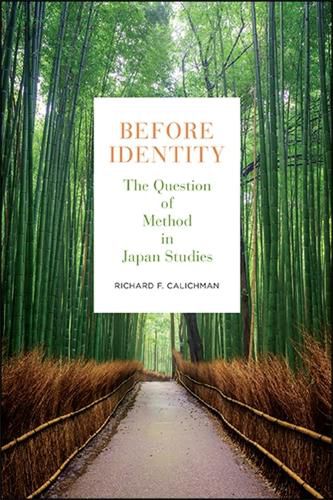Readings Newsletter
Become a Readings Member to make your shopping experience even easier.
Sign in or sign up for free!
You’re not far away from qualifying for FREE standard shipping within Australia
You’ve qualified for FREE standard shipping within Australia
The cart is loading…






This title is printed to order. This book may have been self-published. If so, we cannot guarantee the quality of the content. In the main most books will have gone through the editing process however some may not. We therefore suggest that you be aware of this before ordering this book. If in doubt check either the author or publisher’s details as we are unable to accept any returns unless they are faulty. Please contact us if you have any questions.
Before Identity represents the first attempt to provide a comprehensive examination of the methodological ground of Japan studies. At its most basic level, the field presupposes the immediate empirical existence of an entity known as the Japanese people or Japanese culture, from which it then carves out its various objects of inquiry. Richard F. Calichman attempts to show that this presupposition is itself ineluctably bound up with modern forms of knowledge formation, thereby enlarging the scope of what is meant by modernity. In this way, he aims to bring about a heightened level of theoretical-critical vigilance in the field.
Calichman explores the methodological commitments implied or expressed in the work of a range of writers and scholars-Murakami Haruki, Komori Yoichi, Harry Harootunian, Tomi Suzuki, Alan Tansman, and Dennis Washburn-and how such commitments have shaped and limited the field. If theoretical issues in Japan studies are not subjected to this sort of in-depth scrutiny, Calichman argues, then the field will continue to remain ghettoized relative to other disciplines in the humanities and social sciences, which have typically been more receptive to conceptual discourse. By showing that scholarly inquiry must begin not at the level of the object but rather at the more fundamental level of methodology, Calichman aims to introduce a greater degree of theoretical rigor to the discipline of Japan studies as a whole.
$9.00 standard shipping within Australia
FREE standard shipping within Australia for orders over $100.00
Express & International shipping calculated at checkout
This title is printed to order. This book may have been self-published. If so, we cannot guarantee the quality of the content. In the main most books will have gone through the editing process however some may not. We therefore suggest that you be aware of this before ordering this book. If in doubt check either the author or publisher’s details as we are unable to accept any returns unless they are faulty. Please contact us if you have any questions.
Before Identity represents the first attempt to provide a comprehensive examination of the methodological ground of Japan studies. At its most basic level, the field presupposes the immediate empirical existence of an entity known as the Japanese people or Japanese culture, from which it then carves out its various objects of inquiry. Richard F. Calichman attempts to show that this presupposition is itself ineluctably bound up with modern forms of knowledge formation, thereby enlarging the scope of what is meant by modernity. In this way, he aims to bring about a heightened level of theoretical-critical vigilance in the field.
Calichman explores the methodological commitments implied or expressed in the work of a range of writers and scholars-Murakami Haruki, Komori Yoichi, Harry Harootunian, Tomi Suzuki, Alan Tansman, and Dennis Washburn-and how such commitments have shaped and limited the field. If theoretical issues in Japan studies are not subjected to this sort of in-depth scrutiny, Calichman argues, then the field will continue to remain ghettoized relative to other disciplines in the humanities and social sciences, which have typically been more receptive to conceptual discourse. By showing that scholarly inquiry must begin not at the level of the object but rather at the more fundamental level of methodology, Calichman aims to introduce a greater degree of theoretical rigor to the discipline of Japan studies as a whole.